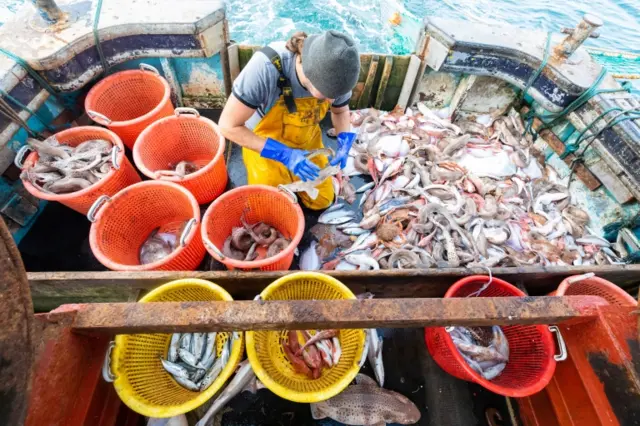Were there hold-ups in first week after Brexit?published at 17:22 GMT 8 January 2021
Low traffic at borders has meant there have been few problems in Kent, but there have been other issues.
Read MoreLow traffic at borders has meant there have been few problems in Kent, but there have been other issues.
Read MoreCapitol Hill saw protests and riots, but what is the area and why is it so important?
Read MoreThere's speculation over who was involved in the protests and whether they belong to organised groups.
Read MoreThe fringe conspiracy theory is facing a crackdown by social media platforms, although it's been growing especially in the US.
Read MorePresident Trump and others have made unsubstantiated claims of fraud in two Senate election run-offs.
Read MorePresident Donald Trump says the vice-president can reject Mr Biden's electors, but is that correct?
Read More Reality Check
Reality Check
Several MPs have disagreed with the prime minister’s assertion that “as long as restrictions are in place, we will continue to support everyone affected by them".
There are many groups of people who have complained that they are not receiving support, having lost their livelihoods as a result of the pandemic.
Examples include people who are the directors of their own companies and pay themselves through dividends rather than a salary.
There are also those who have complicated employment histories, so in recent years might have been directly employed by a company for some of the time, self-employed for some of the time or a combination of the two.
Both of these groups have been finding that they are neither eligible to be furloughed nor able to claim the Self-Employment Income Support scheme, and not all of them will qualify for universal credit.
You can read about three people who feel they have had insufficient support here.
 Reality Check
Reality Check
 Image source, Getty Images
Image source, Getty ImagesPrime Minister Boris Johnson told the Commons that the government “will do everything possible to support” the move to home learning, after schools closed to the majority of pupils because of the lockdown. This includes providing laptops and tablets to disadvantaged families.
According to government figures published in December, the Department for Education had provided 562,421 devices (341,869 of them were distributed since the start of the academic year). Mr Johnson said more had been delivered at the start of this term.
But there are still challenges in using these devices to access remote learning.
According to data published last year by Ofcom, the UK's telecoms regulator, up to 913,000 children can only access the internet using mobile data (so it could prove expensive to watch educational videos, for example) while up to 559,000 children have no access to the internet at all.
On this issue, Mr Johnson said the government had “partnered” with some of the UK’s leading operators to provide free mobile data to disadvantaged families “to support access to education resources”.
The prime minister gave examples of the benefits of Brexit for "ordinary voters". How do they stack up?
Read More Reality Check
Reality Check
Boris Johnson said that the UK has vaccinated more people than the rest of Europe combined.
As of 27 December, 944,539 people in the UK had received the first dose of the Covid-19 vaccine produced by Pfizer and BioNTech.
The latest data from 22 of the EU's 27 member states, collected by Our World in Data, shows 682,279 vaccinations have been carried out so far.
As each EU member state publishes its own statistics, some of this data goes up to early January but some only to late December.
Germany is leading the EU, having vaccinated 265,610 people as of 3 January. France though had only vaccinated 516 citizens by 1 January and the Netherlands won't begin vaccinations till 8 January.
The UK started vaccinating citizens with the Pfizer jab on 8 December, while the EU vaccine rollout began on 27 December.
 Reality Check
Reality Check
We know that the UK is going to threat level 5, the highest level, which means there is a danger of the NHS being overwhelmed within 21 days.
When the prime minister announced these threat levels in May he was clear that during the first lockdown the country had only been in level four.
At the time he also said:, external “The higher the level, the tougher and stricter we will have to be.”
So on that basis should we have expected tighter restrictions in England than we saw during the first lockdown in March?
If anything, the restrictions appear slightly less severe. For example, support bubbles and childcare bubbles exist this time. Also, outdoor playgrounds will be open when they were closed last time.
Communal worship is still allowed as long as social distancing is observed.
One significant change since March is that face coverings are compulsory in indoor public settings such as shops, public transport or places of worship.
 Reality Check
Reality Check
As the prime minister takes further action in England, it is clear that the situation is worse than before the second lockdown began in early November.
Back then, on 5 November, the case rate was 247 cases per 100,000 people.
Now it’s more than double that with 519 cases per 100,000.
And looking at the speed of increases before the lockdown, the coronavirus rate has increased by 70% in the past two weeks, compared to 10% in the period running up to the November lockdown.
As ever, we must look at all sources of data, as case rates can also be influenced by mass testing.
Looking at hospital data, the situation is – again – more serious.
There are currently now on average 2,550 new coronavirus admissions every day; this is compared to 1,327 on 5 November.
The president made a string of claims in a phone call with officials in Georgia as he disputes the state's election result.
Read MoreWith a Brexit deal done, we look at the challenges to come at British borders.
Read MoreReality Check investigates the value of foreign-owned British fishing quotas.
Read More Reality Check
Reality Check
Prime Minister Boris Johnson told the House of Commons earlier that his deal would provide certainty for businesses, including in financial services.
But the trade deal concentrates mainly on the sale of goods. It does not do much to help UK financial services companies access EU markets.
They will not have the automatic right to offer their services across the EU, as they did when the UK was a member state. Instead, they will have to rely on decisions that their regulations have “equivalence” with those in EU member states. Equivalence decisions may be withdrawn with 30 days notice and they exclude some core banking services.
The EU has said that decisions on equivalence will not be made before the beginning of January.
The prime minister told the Sunday Telegraph that the Brexit deal “perhaps does not go as far as we would like” for financial services.
Chancellor of the Exchequer Rishi Sunak has said that in the next few months, the UK and the EU would agree on a memorandum of understanding to give more detail about how the financial services relationship will work.
The trade body for financial services, UK Finance, welcomed the deal , externalsaying it “brings much needed certainty for businesses”, but added that “it will be important to build on the foundations of this trade deal by strengthening arrangements for future trade in financial services".
 Reality Check
Reality Check
Fishing was one of the final sticking points in the post-Brexit trade talks. While fishing is a tiny part of the economy on both sides of the Channel, it carries big political weight.
Regaining control over UK waters was a big part of the Leave campaign in 2016 but some activists have already criticised what is in the deal.
Read more here from BBC Reality Check about what the Brexit trade deal means for the fishing industry.
 Image source, EPA
Image source, EPAA post-Brexit agreement has been announced. Here are 10 key questions.
Read MoreLockdowns around the world have led to record falls in CO2 emissions. But will this lead to long lasting change?
Read More Reality Check
Reality Check
One of the most closely-scrutinised parts of the trade deal will be what it says about fishing, despite it being a very small part of the UK and EU economies.
For decades, the UK’s fishing fleet has been subject to the Common Fisheries Policy (CFP).
The CFP allocates fishing rights among the EU’s 22 coastal states.
According to international law, a coastal nation’s fisheries should extend 200 nautical miles from its coastline or to a maritime halfway point, as part of an area known as the Exclusive Economic Zone (EEZ).
Outside the EU, the UK will become an independent coastal state, regaining control of its EEZ, but, as part of the trade deal, negotiators have been deciding how much fish EU boats should be allowed to catch in UK waters in future.
In 2018, EU-27 vessels caught 863,000 tonnes of fish - worth around £580m - in UK waters, while UK vessels landed 555,000 tonnes (including fish which were worth more), valued at £827m, in the same year.
Fishing only accounts for about 0.02% of the UK economy, but it was an important part of the Leave campaign in 2016, with many British fishermen keen for the UK to control its waters.